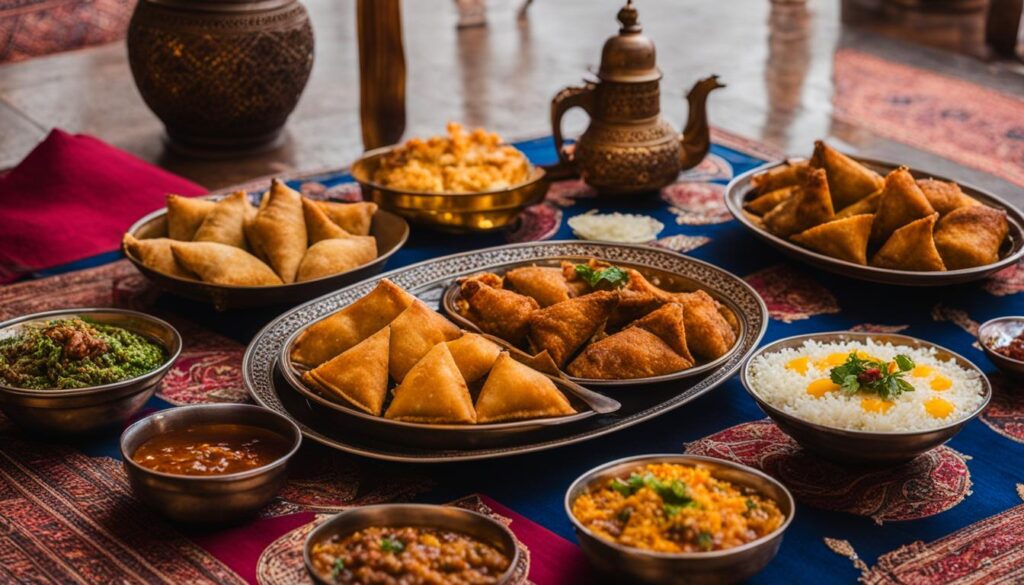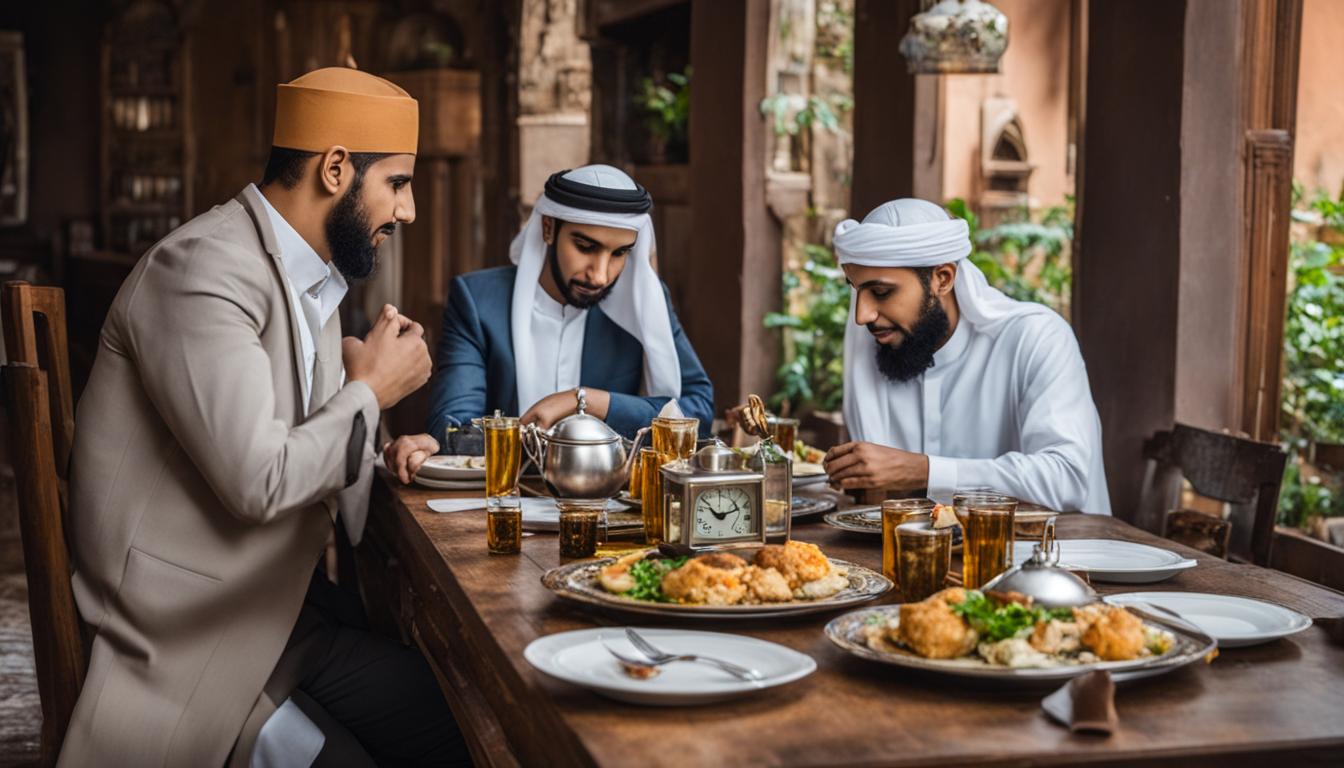Ramadan is a sacred and significant month for Muslims around the world. However, many non-Muslims may be unfamiliar with the customs and traditions associated with this important holiday. In this article, we will explore what Ramadan is, why it is important, and how it is celebrated by Muslims. By gaining a better understanding of Ramadan, non-Muslims can foster greater respect and appreciation for their Muslim friends and colleagues.
Key Takeaways:
- Ramadan is the holiest month in the Islamic faith, marked by fasting and spiritual focus.
- Muslims fast from food, drink, and other activities from sunrise to sunset during Ramadan.
- Understanding the cultural significance of Ramadan can help non-Muslims appreciate the diversity within the Muslim community.
- As a non-Muslim, showing interest and respect for Ramadan traditions can help build bridges and foster understanding.
- Fasting during Ramadan can have physical and emotional impacts on Muslims, but it is seen as a way to deepen spiritual connection and empathy.
What is Ramadan?
Ramadan is a holy month in the Islamic lunar calendar, marked by spiritual focus and renewal. It begins when the crescent moon is sighted and lasts for 29 or 30 days. During this time, Muslims observe fasting as one of the key practices of Ramadan. Fasting involves abstaining from food and drink, including water, from sunrise to sunset each day.
Fasting in Ramadan is seen as an act of worship, a way for Muslims to grow closer to Allah and to develop qualities such as patience, compassion, and self-control. It is also a time for increased prayer, reflection, and acts of charity. Muslims believe that their good deeds and prayers during this month are multiplied, making it a particularly auspicious time for spiritual growth.
Throughout Ramadan, Muslims also refrain from engaging in sexual activity, anger, and immoral acts. By purifying their behavior and thoughts, Muslims aim to deepen their connection with Allah and strengthen their commitment to living a righteous life.
Why is Ramadan Important?
Ramadan holds significant importance for Muslims around the world. It is a time of deep spiritual reflection, increased devotion, and acts of charity. Muslims believe that Ramadan commemorates the occasion when Allah gave the Quran to the prophet Mohammad, making it a sacred month filled with blessings and opportunities for growth.
One of the main beliefs behind Ramadan is that fasting during this month allows Muslims to draw closer to Allah and develop virtues such as patience, compassion, and self-control. Fasting is seen as an act of worship and a way to purify the mind, body, and soul. Muslims also engage in increased prayer and recitation of the Quran, seeking guidance and spiritual enlightenment.
In addition to personal spiritual growth, Ramadan is a time for Muslims to strengthen their sense of community. It is common for families and friends to come together to break their fast at sunset, sharing a meal called iftar. This communal practice fosters a sense of unity and solidarity among Muslims. Additionally, many Muslims participate in acts of charity during Ramadan, giving back to their communities and helping those in need. This emphasis on generosity and compassion is a fundamental aspect of Ramadan.
Key beliefs and customs of Ramadan:
- Fasting as an act of worship and a way to grow closer to Allah.
- Increased prayer and recitation of the Quran.
- Acts of charity and giving back to the community.
- Gathering with family and friends for iftar, the meal to break the fast.
- Emphasis on virtues such as patience, compassion, and self-control.

These practices and traditions of Ramadan foster spirituality, self-discipline, and compassion among Muslims. They create a sense of unity and solidarity within the global Muslim community, as Muslims around the world engage in these practices together, regardless of their cultural or regional differences.
Cultural Significance of Ramadan
While Ramadan is rooted in the Islamic faith, it also holds cultural significance for Muslims worldwide. This month-long observance celebrates unity, compassion, and self-reflection within the Muslim community. Understanding the cultural variations within Ramadan can help non-Muslims appreciate the diversity and richness of traditions associated with this sacred time.
Customs and Traditions
The celebration of Ramadan varies across different cultures and communities. From the foods eaten during iftar to the customs observed during fasting, each culture brings its unique flavor to this sacred month. For example, in some cultures, families come together for iftar with extended family and friends, while others prefer to gather at the local mosque. These customs form an integral part of the Ramadan experience and showcase the rich tapestry of traditions within the Muslim community.
Interfaith Dialogue and Unity
Ramadan also provides an opportunity for interfaith dialogue and understanding. Non-Muslims can engage in conversations with their Muslim friends and colleagues about their fasting experience, reflecting on what they have learned during Ramadan, and the communal aspects of the month. By showing genuine interest in their traditions and customs, bridges of understanding can be built, fostering unity and respect between different cultures and religions.
Charitable Acts and Community Outreach
One of the key aspects of Ramadan is the emphasis on acts of charity and community outreach. Muslims use this time to give back to their communities by feeding the hungry, providing assistance to the less fortunate, and engaging in other charitable acts. These acts of kindness and compassion serve as reminders of the importance of generosity and gratitude, transcending cultural boundaries and inspiring people of all backgrounds to make a positive impact in their communities.
Connecting with Ramadan as a Non-Muslim
As a non-Muslim, it is important to approach Ramadan with an open and respectful mindset. This holy month holds great significance for Muslims worldwide, and by understanding and appreciating their traditions, you can foster meaningful connections. Here are some ways to connect with Ramadan as a non-Muslim:
- Learn about Ramadan: Take the time to educate yourself about the meaning, practices, and customs of Ramadan. Read books, watch documentaries, or consult reputable online sources to gain a deeper understanding of this sacred month.
- Engage in dialogue: Initiate conversations with your Muslim friends and colleagues about their Ramadan experiences. Ask respectful questions about their observances, such as their fasting routines, prayers, and acts of charity. Showing genuine interest and curiosity will help build bridges and foster understanding.
- Participate in shared activities: Join your Muslim friends or colleagues for an iftar meal, where the fast is broken at sunset. Sharing a meal together can create a sense of community and provide an opportunity to learn more about Ramadan firsthand.
Respecting boundaries
While it is important to connect with Ramadan, it is equally important to respect the boundaries set by Muslims during this holy month. Understand that fasting can be physically and emotionally challenging, so avoid offering food or drinks during fasting hours. Instead, offer your support and understanding. Remember that Ramadan is a time of reflection and worship, so be mindful of noise levels and try to create a calm and peaceful environment for your Muslim friends or colleagues.
By approaching Ramadan with respect, curiosity, and empathy, you can forge meaningful connections with the Muslim community and gain a deeper appreciation for their faith and culture.
Fasting and Its Impacts
Fasting during Ramadan is a significant practice for Muslims, and it can have physical and emotional impacts on individuals observing the fast. Initially, some Muslims may experience hunger, thirst, and fatigue as their bodies adjust to the change in routine. However, many find that fasting deepens their spiritual connection, promotes discipline, and fosters empathy for those who are less fortunate.
Physically, fasting can lead to weight loss and improved metabolic health as the body adjusts to using stored energy. It can also provide an opportunity for the digestive system to rest and detoxify. Emotionally, fasting can bring a sense of accomplishment and self-control, as well as a heightened awareness of one’s dependence on sustenance. It can strengthen the bond within the Muslim community as they come together to break their fast and share meals during iftar.
The Impacts of Fasting:
- Physical effects: weight loss, improved metabolic health, detoxification
- Emotional effects: sense of accomplishment, self-control, heightened awareness
- Social effects: strengthened community bond, sharing meals during iftar
As a non-Muslim, it is important to be supportive and understanding of the challenges that fasting may present. Offering words of encouragement, being mindful of any food-related conversations, and respecting the fasting hours can show empathy towards your Muslim friends and colleagues during Ramadan.
Conclusion
Ramadan is a significant and sacred month for Muslims worldwide, encompassing beliefs and customs that are deeply rooted in their faith. By understanding the meaning and practices of Ramadan, non-Muslims can develop a greater appreciation for the spiritual journey undertaken by their Muslim friends and colleagues.
Through open dialogue, respect, and a willingness to learn, we can bridge cultural divides and promote greater understanding and unity in our diverse society. This can be achieved by engaging in conversations about Ramadan, asking questions about fasting experiences, and expressing genuine interest in the teachings and customs observed during this holy month.
By recognizing the importance of Ramadan to Muslims and acknowledging the values it instills, such as patience, compassion, and self-control, we can foster a sense of community and mutual respect. This understanding can strengthen connections between individuals of different backgrounds and contribute to a more inclusive and harmonious society.
FAQ
What is Ramadan?
Ramadan is the holiest month in the Islamic lunar calendar. It is marked by spiritual focus and renewal, and Muslims fast from sunrise to sunset during this time.
Why is Ramadan important?
Ramadan holds great significance for Muslims as it commemorates when Allah gave the Quran to the prophet Mohammad. Fasting during Ramadan allows Muslims to grow closer to Allah and develop virtues such as patience, compassion, and self-control.
What are the traditions and practices of Ramadan?
During Ramadan, Muslims wake up before dawn to have a pre-fast meal called suhoor. Throughout the day, they abstain from food, drink, smoking, and other activities. The fast is broken at sunset with a meal called iftar, and Muslims are encouraged to pray, read the Quran, and reflect.
What is the cultural significance of Ramadan?
Ramadan has cultural significance for Muslims worldwide, and the celebration can vary across different cultures and communities. The foods eaten during iftar, customs during Ramadan, and the way the fast is broken at sunset can differ based on cultural traditions.
How can non-Muslims connect with Ramadan?
Non-Muslims can connect with Ramadan by showing an interest in their Muslim friends and colleagues’ fasting experience, learning about their traditions and customs, and asking them about what they have learned during Ramadan.
What are the impacts of fasting during Ramadan?
Fasting during Ramadan can have physical and emotional impacts on Muslims. They may experience hunger, thirst, and fatigue, but many find that fasting deepens their spiritual connection, promotes discipline, and fosters empathy for those in need.

